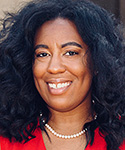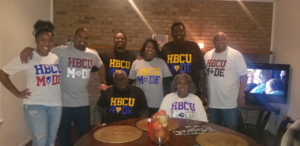December 3rd, 2019
To HBCU or not to HBCU? That Is the Question.
Allison Latimore, MD

Dr. Latimore is the Education Chief Resident at the MedStar Washington Hospital Family Residency Program in Washington, DC
Finding my home
There were a sea of students sitting in the auditorium, and parents were all directed to the balconies. The sound of trumpets began to blare, and the bodies of the marching band swayed rhythmically. Five minutes after soaking in the music, the ambiance, and the liveliness of Howard University, my sister and I locked eyes and decided that we were home.
Historically Black Colleges and Universities (HBCUs) are defined in the Higher Education Act of 1965 (amended) as “…any historically black college or university that was established prior to 1964, whose principal mission was, and is, the education of black Americans, and that is accredited by a nationally recognized accrediting agency or association determined by the Secretary [of Education] to be a reliable authority as to the quality of training offered or is, according to such an agency or association, making reasonable progress toward accreditation.” I was privileged enough to attend Howard University in Washington, DC, which is an HBCU founded in 1867. In high school, I made this calculated decision because I was aware that Howard University was one of the top institutions for educating black medical school applicants in the United States.
Finding my career
However, as I matriculated through my undergraduate career and met other pre-meds, I began to realize that some people held the idea that going to an HBCU to prepare for medical school was not good enough. Some underestimated how well HBCUs prepare their students for a career in medicine. Unfortunately, I subscribed to these ideas for a while, due to peer influence, and struggled with the MCAT. It was not until I got a glimmer of hope, in the form of an email from Meharry Medical College, that I believed my dreams could still come true. I was offered an interview for the Master of Health Science Program, which is similar to a post-baccalaureate program. Suddenly, my thoughts of leaving the HBCU world went away. When many other schools said no, Meharry Medical College saw something in me, and said yes.
Finding my “family”
Attending Meharry gave me the same warm feeling as attending Howard. Medical students at other institutions and older physicians have described to me the feeling of being sabotaged or having “gunners” hiding information from others to get ahead. These attitudes did exist at Meharry, but were far less common than other places. No one wanted to see anyone else fail. Each class felt like a family. I never had black physicians growing up, and I surely didn’t know many in my personal life. This was the first time I was surrounded by people who looked like me and had achieved the goals that I was so desperate to achieve.
While I was attending medical school, I heard snide remarks from medical students at other institutions — remarks insinuating that it would be difficult to match coming from my institution. These ideas stem from the fact that outside of the African-American community and HBCU community, many people are not aware these schools exist. But many of my classmates matched into their number one choices at some of the top medical institutions in the country, and so did I.
Now what?
HBCUs are special places where you are, finally, not the “only one” in a room, where there is a wonderful mixture of social and academic life, where you physically see what you are aspiring to be. Unfortunately, not everyone sees the incomparable value of HBCUs. On October 1, 2019, federal funding of HBCUs expired after congress failed to extend it.
This left me questioning the future of black doctors in America, underserved patients, diversity in residency training programs, and medicine as a whole. If three major institutions that educate mainly black physicians (Howard University, Morehouse School of Medicine, and Meharry Medical College) lose federal funding, will our medical system become less representative of our patient population? There are other schools that graduate a significant number of black doctors, such as University of Illinois College of Medicine, Wayne State School of Medicine, and David Geffen School of Medicine at UCLA (affiliated with Charles R. Drew University of Medicine and Science, which is also an HBCU), to name a few, but competition for spots is fierce. I understand that people may say, “Well, minority and disadvantaged students interested in a career in medicine just need to study harder, do better on the MCAT, shadow for more hours, do more research, or simply go somewhere else.” To me, it’s just not that simple.
Fortunately, on December 4, 2019, a bipartisan agreement was reached to fund HBCUs. This proposal includes permanent annual funding of $255 million for HBCUs. HBCUs are wonderful places to get an education for both minority and nonminority students, but they cannot be the only resource for educating minority doctors. How can other institutions help promote diversity in the medical education and residency programs?
I’d love to hear your thoughts in the comments below.




Important post, thank you. I would love to also see more how organized medicine could and should be more supportive of students at HBCUs (and of HBCUs in general).
First, my sister friend, I am extremely proud of you. I have watched you become an outstanding doctor and I can’t wait to see you take the world by storm. I echo many of your thoughts taking the same path as you. If I could do it again, I STILL would choose Howard. My sense of self was questioned when applying to medical
school as I didn’t even touch the MCAT until it was almost to late. I only received two interviews for medical school, and even had a Dean at Meharry tell me to leave Meharry, somewhere else is better. I was accepted and I still chose Meharry because the experience is incomparable and I had formed a family. HBCUs are relevant, necessary and an experience of a lifetime. I thank God daily for them and know I wouldn’t be where I am had it not been for Howard University ana Meharry Medical College. ❤️
I graduated from Meharry in 1983. When I received my letter, I knew it was the only place I wanted to be. I integrated Birmingham public schools and attended a majority undergraduate university. I envied my classmates who had gone to Clark, Spellman, Tuskeegee, and Morehouse.
If we talk about medical colleges in Chicago, obviously we have to name Delmon Medical College for its quality teaching for co-curricular activities at the same time.